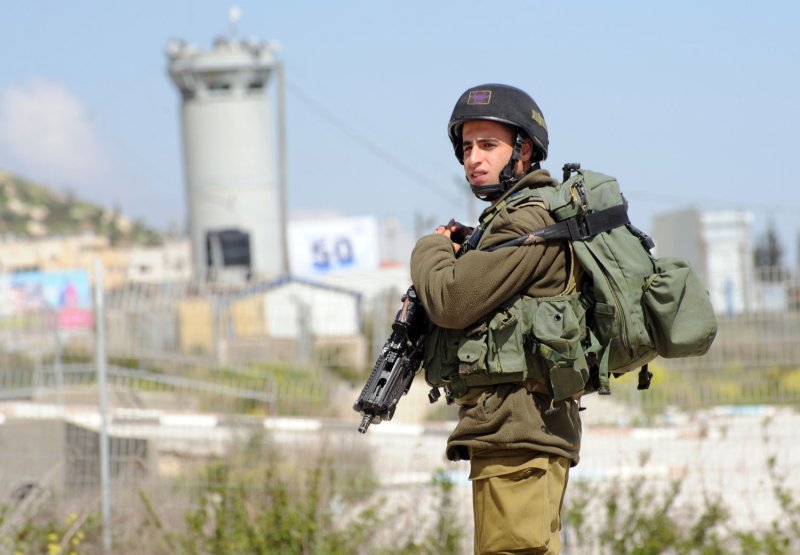1 of 3 | An Israeli soldier guards the road to the Israeli settlement Itamar, West Bank, where five family members were stabbed to death late Friday night by a Palestinian, March 12, 2011. A Palestinian infiltrated Itamar late Friday night, entering the settlers house through a window and stabbed the family to death while they slept. The victims are the parents and three of their children, including an infant. UPI/Debbie Hill |
License Photo
TEL AVIV, Israel, Aug. 12 (UPI) -- Israeli Prime Minister Binyamin Netanyahu is under growing pressure to slash defense spending in the face of mushrooming domestic protests against the high cost of living at a time when the military seeks hefty increases to counter a host of security threats.
The Yediot Ahronot daily reported Thursday that Netanyahu opposes cutting the defense budget, currently pegged at $13 billion, or 7 percent of gross domestic product.
Netanyahu "believes that demands for reductions in the defense budget do not take into account the threats that face our country's security," the newspaper reported.
The hard-line premier is supported by Defense Minister Ehud Barak, who declared Thursday: "The protest is important but we're not Switzerland. We need security because we're in stormy waters."
They have, however, convinced the military to agree to hold the next year's defense budget at current levels.
Amid preparations for the military to counter anticipated trouble in September when the United Nations is expected to vote on an independent Palestinian state, Barak noted, "You can never be ready for every scenario."
The nationwide protests across the political spectrum, with mass demonstrations demanding affordable housing, lower food prices and more jobs, are seen as Netanyahu's biggest domestic challenge since he took office in 2009 for the second time.
The demands for economic reforms -- and even Netanyahu's resignation -- have dramatically shifted the national debate to the economy, eclipsing even the security issue that usually dominates the media.
Netanyahu has promised major spending programs to still the upsurge of discontent.
The political upheaval that has swept the Arab world since January raised new perils and damaged Israel's relations with other U.S. allies, such as Egypt.
Egypt was the first Arab state to sign a peace agreement with Israel in 1979 but that's in jeopardy following the February fall of President Hosni Mubarak.
This means Israel will likely have to deploy military forces along its southern border for the first time since 1979, a costly undertaking.
The possible collapse of the embattled regime in northern neighbor Syria could also trigger greater military activity and possible conflict with a successor regime.
Meantime, Iran, which Israel considers an existential threat, is bent on expanding its influence into the Levant, while its Lebanese proxy, Hezbollah, is gaining political and military power. Many see another Israeli war with Hezbollah as inevitable.
To counter these threats, Netanyahu and Barak have been putting together an ambitious five-year plan for an expanded defense budget.
Few details have yet to emerge but it seems next year's defense budget will be held at current levels to meet protesters' demands.
The Israeli military "prides itself of having managed to stick to the budget for the past four years, something it didn't do previously," observed Haaretz commentator Amos Harel.
"But the inability to plan for the long term undermines the army's effectiveness and strength."
The generals have a costly procurement list that includes acquiring 40 of Lockheed Martin's F-35 Joint Strike Fighters to maintain the air force's supremacy in the region. Israel has already ordered 20 of the aircraft for $2.75 billion but it wants another 20 to have two squadrons of the world's most advanced combat aircraft.
The navy is acquiring three new Dolphin-class submarines, reputedly capable of launching nuclear-tipped cruise missiles, from Germany. Berlin, still haunted by the Holocaust, is providing them at heavily discounted prices.
But the Israeli navy also wants at least two more missile-armed corvettes to bolster its plans to become a long-range, deep-water navy with heavy firepower.
It also needs to provide protection for Israel's newfound natural gas fields in the eastern Mediterranean which will transform the Jewish state's economy.
And billions of dollars are needed to build up a multi-tier missile defense system, developed and built by Israel Aerospace Industries and Rafael Advanced Defense Systems, to counter the vast arsenal of missiles held by Hezbollah, the Palestinian Hamas, Syria and Iran.
Washington has pledged hundreds of millions of dollars to help fund the systems but the U.S. defense budget is also being slashed because of economic woes and further pledges may be problematical.
U.S. congressional leaders have reassured Israel that U.S. military support, including $3 billion a year in military aid, will not be affected.
But as Israelis themselves are now seeing, large military budgets are becoming difficult to sustain.















